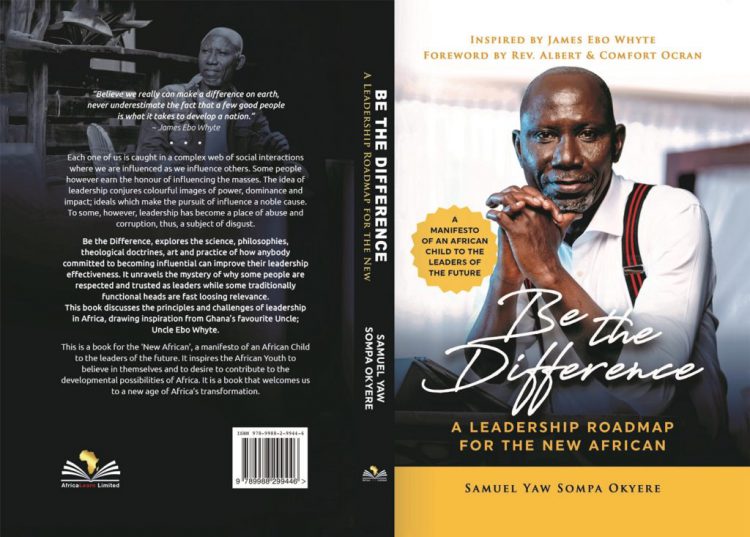It would be easy, by just look ing at the cover of the new book entitled Be the Difference, to assume that it is a biography of James Ebo Whyte, the acclaimed author, play right and social commentator. Even if that is what it indeed was, it would be worth reading – after all Mr Whyte is one of Ghana’s most illustrious, and therefore respected sons. It is not for nothing that he is widely known simply as “Uncle Ebo.” As at today he has written 44 plays, produced them 620 times and has authored 74 editions of the Rover Reports, a widely read periodical magazine. Add to all those, authorship of two bestseller books and hosting of radio programmes since 1995.
But this new book, authored by Samuel Yaw Sompa Okyere, a young man who is following in Mr Whyte’s footsteps as a key member of Ghana’s intelligentsia, goes far beyond that. Indeed, while the book was inspired by the lifetime achievements of Mr Whyte, who is repeatedly used as a role model for the topic being addressed, it takes on a much bigger – and more universal – topic: leadership.
This is affirmed by the book’s sub-title: “A leadership roadmap for the new African”, and indeed, this is precisely what the book is – a treatise on leadership required for the ongoing African renaissance.
The use of Mr Whyte however is absolutely crucial in that the book seeks to convince that leadership is not just something for the social, political, economic and cultural elite; rather it is something needed at every level, from household to government, and everyone can use good leadership skills and traits to make a difference in society as a whole, just as Mr Whyte has done.
The author has all the potentials to be a prolific one. This book is coming on the heels of his debut, “The fate of system thinking”, which is still the only book to date that reviews the 2017-2019 banking sector crisis in Ghana, and which uses lessons from it to teach how to build strong, resilient indigenous companies.
That book focuses on issues of corporate governance but his latest effort is more ambitious, addressing the concept of leadership in its totality, but with a specifically African context.
He does this over five broad chapters, that first of all examines Mr Whyte as a desirable standard for leadership quality, before defining leadership itself, defining the journey to becoming a leader, and identifying the hurdles one would meet along the way.
This makes the book an invaluable tool for everyone who aspires to be a leader of one sort or the other. But just as importantly it shows readers that everyone needs to be a leader at one level or the other and by doing it correctly can make a lasting positive difference on both their own lives and all those they interact with.
To be sure Mr Okyere will not win any popularity contests with this book; many leaders in Africa will see their leadership shortcomings vividly exposed by the author’s treatise. But that is part of why it is so essential reading. Those shortcomings can be avoided by reading this book.
But most important of all, is that this book shows that one does not have to be a winner of the never-ending societal rat race to make a difference. In a country where such winners are applauded as the only real leaders, no matter the methods they used to win, this book is like a breath of fresh air.
The book can be purchased at SU Bookshop, SU Towers; Ghana School of Law Bookshop, Makola and other reputable bookstands in Accra.













